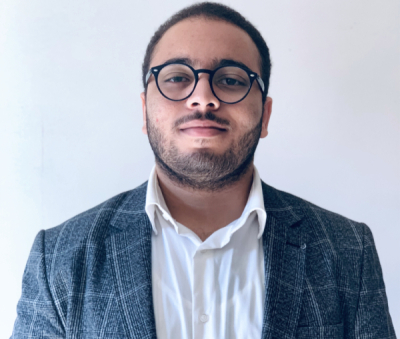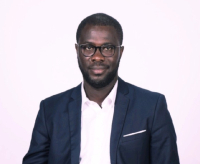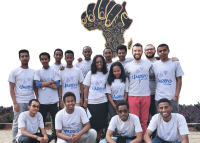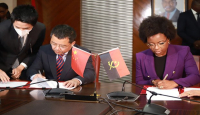The coronavirus pandemic and the Ebola outbreak fragilized the education system in Guinea. This highlighted the need to set up innovative tools to back the education system.
Last Friday, the United Nations Children's Fund (UNICEF) and the Guinean Ministry of Pre-University Education launched the pilot phase of the e-learning platform "Learning Passport," at Gbessia Port 1 elementary school in the commune of Matoto, Conakry. The new digital platform, created to support student learning, will provide continuous access to educational resources for children, youth, and teachers.
According to Dr. Adama Ouedraogo (photo, left), UNICEF's Acting Representative in Guinea, the new platform will help "improve teaching and learning and enhance the skills and knowledge acquired both formally and informally." "To students, it means continuous access to the curriculum and additional learning materials. To teachers, it means steady access to training opportunities and educational support," he added.
Over the four coming months, the platform will be test-run in two schools (Ratoma Centre and Gbessia port 1) in Conakry. The National Institute of Preventive Archaeological Research (INRAP), with the support of UNICEF, will assess teachers' and students' ability to access the digital content available on "Learning Passport."
The platform, delivered by UNICEF and powered by Microsoft Community Training, was developed with a unique suite of online and offline features and capabilities. It will first be deployed in places with intermittent or no Internet connectivity - often places where children find themselves unable to access quality digital educational tools and content.
Samira Njoya
The digital component of Congo's 2022-2026 National Development strategy plans the construction of a number of tech infrastructures. To fulfill that ambition, the government is multiplying partnerships with key partners.
Last Friday, Congolese Digital Minister Leon Juste Ibombo welcomed a delegation of the Dubai-based consortium Presight ai Limited-G42.
During the audience, the parties discussed the finalization of a recent partnership aimed at funding several projects that will improve digitization and the construction of key tech infrastructures, which will benefit the population.
"Our partners came with documents that will allow us to reach out to the Ministry of Finance for the financing agreement before the implementation phase. With the negotiations concluded, we will move to finalize the project," Leon Juste Ibombo said.
The visit of the Emirati team is the result of a cooperation process that started a few months ago. Indeed, on March 28, 2022, in the United Arab Emirates, Congo signed a partnership agreement with Presight ai LimitedG42 to combine their digital transformation efforts and expertise.
The agreement is one of the partnerships sealed by Congo for the implementation of its 2022-2026 national development strategy for a strong and diversified economy. In recent months, the country has signed similar agreements with international firms including Indian ATDXT and Canadian Casimir Network. The agreement with Casimir Network provides for the training of local tech talents as well as the construction and operationalization of a data center that will host the country's blockchain services.
Samira Njoya
The solution aims to help users save time and cost in a context marked by accelerated digital transformation.
BuuPass is a tech solution developed by a Kenyan startup. It allows users to buy, air, and train tickets or compare the prices when multiple sellers exist.
For its co-founder Wyclife Omondi (photo, right), "It takes travelers unnecessary time and money to compare platforms while trying to book tickets. With BuuPass digitalization, both challenges are taken care of because we cut costs for users or commuters and reduce administrative overhead for bus operators by offering a fleet and parcel management solution."
The solution has an Android app that enables users to create accounts, access various features, and even pay tickets via mobile money. On PlayStore, the app has already been downloaded more than 10,000 times.
Let's note that Buupas also has an API that enables companies to get listed. Currently, Buupas claims over 9 million bus tickets sold online. Before becoming BuuPass, It was MagicBus Ticketing. Under that name, it won the 2016 Hult Prize Challenge, going home with a US$1 million check.
Adoni Conrad Quenum
The investor sees entrepreneurship as a tool to resolve the most complex challenges in Africa. She, therefore, invests in entrepreneurs through her VC firm We Fund Women.
Hope Ditlhakanyane (photo) is the South African investor who founded VC firm We Fund Women to support women-led businesses' growth by giving them access to capital.
Her VC firm, launched in 2020, enables angel investors to invest in early-stage gender-smart startups easily. Its ambition is to support 100 gender-smart startups by 2025.
"We Fund Women is a gender-lens investing community so we aim to do three things. Firstly, we want to amplify the stories of different women entrepreneurs across the continent by giving them the platform to talk about their journeys. Secondly, we aim to connect capital allocators and people who can provide growth support to promising women with great innovations. Overall, what we're trying to do is leverage community to catalyze the move towards gender equality on our continent within the VC space," Hope Ditlhakanyane explains.
The VC investor is also the Head of venture sourcing for VC firm Founders Factory Africa, which she joined as a venture sourcing lead in January 2021. With Founders Factory Africa, she headed investments in several firms including Pneumacare, Zuri Health, Baia, Vitruvian, and Tibu Health.
For MEST Africa, which she joined as a venture partner in 2020, she worked with portfolio companies in four markets: Ghana, Nigeria, Kenya, and South Africa. In 2019, she worked for consulting firm Kearney as a Senior business analyst.
Thanks to her works, the Cape Town University graduate made it to Yahoo Finance and Mail & Guardian's respective lists "200 Young South Africans" and "100 Women Future Leaders."
Melchior Koba
He embarked on entrepreneurship early while still working for financial institutions. His fintech aims to provide clients with automated tools to manage investments in several instruments and asset classes.
Reda Hachimy (photo) is a Moroccan entrepreneur and the founder/CEO of fintech startup Capital Quant Agency, which specializes in financial and capital markets.
Capital Quant Agency, founded in 2019, provides financial institutions, trading rooms, asset managers, and institutional investors with a powerful capital and financial markets decision-making software SaaS adapted to their specific needs. Its software helps clients evaluate investment opportunities and optimize their portfolios.
" Capital Quant Agency's main mission as an innovative startup is to develop for its clients, notably trading rooms and asset managers, a powerful, scalable, and modular capital market SaaS software that will help them achieve improved operational and strategic performance," Reda Hachimy said in December 2022.
In May 2022, he founded "Annuaire des consultants," an exclusive network of French-speaking consultants, consultancy firms, and experts. The online directory aims to showcase its members and improve their visibility with institutions seeking experts for their projects. Doing so, it expects to help members land impactful missions in Morocco and abroad.
The founder's professional experience consists of stints with financial institutions. In January 2020, he worked for the Moroccan Interprofessional Pension Fund as a data scientist. In February 2021, he also worked as a quantitative analyst for the investment bank Valoris Group. From February to April 2021, he worked in the markets division of Citibank.
Let's note that in 2022, Capital Quant Agency was crowned Africa's WealthTech Company of the Year and Best FinTech Solutions Provider in the MENA region.
Melchior Koba
Africa's fintech sector has attracted a growing volume of investments in recent years. The investments notably encourage innovation and improve financial inclusion.
APaym is a fintech startup developed by Ivorian tech company Weblogy, founded in 1998. Using QR code technologies, it helps send payments and easily manage funds.
Using its Android and iOS apps, users have to create their APaym accounts and add funds to their accounts via bank cards or mobile money to access its various services. Once they fund their APaym wallets, they can for instance pay their bills without bank cards. All they have to do is to scan the merchant's QR code and the bill will automatically be settled even if the merchant's bank is different from the buyer's.
Thanks to APaym, users can also make fee-free card-to-card transactions, and send funds directly into bank accounts in Africa, Europe, and Asia. They can also send funds to mobile money accounts in Africa or make express transfers (Express Union and Wari).
MTN Côte d'Ivoire's subscribers can use the APaym apps without internet data. The solution also has a USSD code that enables use on feature phones. Currently, the APaym Android app has been downloaded more than 50,000 times on Playstore.
Adoni Conrad Quenum
Charles Kouame is the senior manager in charge of the deployment of telecom group Orange's Djoliba, a fiber-optic network that will interconnect West African countries and even more countries outside the region. With We Are Tech, he discusses the advancement of the project and its prospects.
In 2020, Orange announced Djoliba, its fiber optic network that will connect West African countries. What is the status of the project?
We have already connected six countries namely Côte d'Ivoire, Senegal, Burkina Faso, Mali, Ghana, and Nigeria. Connection is ongoing in two countries; Liberia and Guinea. We aim to build a network infrastructure that will interconnect most West African countries like the Djoliba river which irrigates a large part of the sub-region. The project was initiated because of the growing demand for broadband connections in Africa.
When Djoliba was launched in 2020, Orange invested a little over EUR 8 million. In 2022, the network, which was already congested of being greatly overrun was upgraded. To improve its capabilities, Orange made an additional investment in the Djoliba project.
Djoliba greatly contributes to the development of connectivity in Mali, Burkina Faso, and Guinea-Bissau. The infrastructure enabled many firms, notably banks operating in the sub-region, to easily interconnect with their headquarters based in Dakar or Abidjan.
The system's capacity is infinite. It can be increased by adding the appropriate equipment. To date, its equipped capacity is 300 gigabytes. The initial capacity was 100 gigabytes but an additional 200 gigabytes have been added this year.
Why was such a large project initiated just for the West African region?
West Africa hosts the largest number of Orange subsidiaries. It was thus selected to host phase 1 which targets eight countries. The second phase will target Central African countries like Cameroon and the Democratic Republic of Congo. The project will also target countries like Morroco, Niger, Mauritania, Togo, Benin, and Sierra Leone. Later, around 2025, we will even consider expanding the network to South Africa, Botswana, and Kenya. The aim is to connect the major capital cities where there is greater internet traffic even in countries where Orange is not present. With Orange group's point of presence on every continent, the Djoliba network, which is interconnected with those points of presence, gives our clients round-the-world reach.
Specifically, what will this infrastructure be used for?
Orange aims to popularize broadband connection by making major investments, which will help offer quality but most affordable internet. In under a year, for instance, Djoliba allowed the Malian subsidiary to make unlimited offers. Djoliba also helps meet the needs of subscribed operators, internet service providers, and firms.
We all noticed that the coronavirus pandemic caused a surge in telecommuting. Some of our lifestyle habits have virtually changed. To improve their operational efficiency, businesses need some online tools and quality broadband is required to access those tools.
Companies in the banking, mining, and telecom industries among others have bought Djoliba's fiber capacities to improve their collaboration with their headquarters and their access to information technologies. Djoliba is also useful for mobile operators. The pan-African network was launched to improve digital inclusion in Africa.
With the advent of Djoliba, affordable broadband connectivity has supported the development of content creation in several countries. Influencers can now give more visibility to their activities. The fiber optic network is also a great opportunity for online services because, with poor or inaccessible internet, their clients cannot buy their online services.
Is Djoliba different from similar projects like 2Africa, where Orange is also committed?
Djoliba is a network built from terrestrial and submarine fiber optic cables. When commissioned, 2Africa will be integrated into Djoliba. Djoliba's current submarine routes include the Africa Coast to Europe (ACE), South Africa Transit 3 (SAT3), or the West Africa Cable System (WACS). We have terrestrial routes secured by submarine routes. We are waiting for the arrival of the 2Africa cable to integrate it into the network and offer our customers a resilient network system. Djoliba will also help offer a secured terrestrial extension to the capacities of the 2Africa cable.
The World Bank estimates that hundreds of millions of Africans still live more than 50 km away from a fiber optic network. How does Orange intend to improve access (offer and cost) for populations with a growing need for very high-speed broadband?
Through its subsidiaries, Orange heavily invests in the development of fiber optic networks in its markets. Some of those markets, like Mali, Burkina Faso, and Guinea, are virtually virgin territories. Therefore, the investments made by Orange are huge. In the major cities of those markets, Orange is investing heavily to fulfill the strong commitment made by Orange Middle East and Africa. The aim is to bring fiber optics closer to populations and households. The various Orange Middle East and Africa subsidiaries are deploying their fiber optic infrastructure and Djoliba will allow them access to more internet capacities thanks to its network of subsea cables whose international traffic it carries. When 2Africa lands in Dakar and Abidjan, Burkina Faso and Mali will access its capacities through Djoliba, which is a secured transport system.
What is Orange's plan to meet the growing broadband connectivity demand in rural areas?
Orange wants to popularize broadband in the Middle East and Africa. It is therefore making huge investments in domestic pan-African and subsea fiber optic networks. Despite the investments made, some rural areas still have no access to broadband. To meet the demand in those areas, our state can also deploy fiber optic networks in remote areas through universal service funds.
With digital transformation accelerating in most countries, Africa needs a highly-skilled workforce, which is experienced with concrete projects, to achieve the much-awaited fourth digital revolution.
Last Tuesday, Africa to Silicon Valley (A2SV) announced it secured funding from Google to implement its project aimed at boosting tech talent in Africa.
The foundation explained that the funding will support the establishment of a "permanent office in Ethiopia and hire more heads of education and a product manager." "The goal is to expand A2SV’s presence to Ghana and upskill 330 more students in Ethiopia and Ghana over the next two years, building a pool of highly trained, industry-ready candidates who have experience with real-life projects," it adds.
“Aspiring software developers in Africa lack access to experienced mentors and job opportunities. Academic education fails to equip them with the skills they need in real-world contexts. We address this gap through our rigorous training program comprising daily classes, boot camps, and real-life projects," said Emre Varol, A2SV founder and head of executions.
According to a report by consultancy firm Korn Ferry, the global tech ecosystem could experience a shortage of over 85 million workers by 2030. With 400 million young people aged between 15 and 35, Africa has the youngest population and can help fill that gap if its talent pool is built in time.
Africa to Silicon Valley was founded in 2019. Its priority is to build the best talent pool. It offers a rigorous training program that prepares candidates for interviews with leading tech companies. The said program covers aspects like algorithms and data structures, soft skills, and real-world projects.
Samira Njoya
The cable aligns with the government's strategy to develop the digital sector and extend competitive telecom services in remote areas.
Last Wednesday, in Luanda, China and Angola signed an about US$249 million concessional loan agreement for a national broadband project.
According to Pascoal Borges Alé Fernandes (Angola's Secretary of State for Telecommunications and Information Technology), the project will dynamize and extend Angola's network infrastructure.
"We are talking about the implementation of around 2,000 kilometers of terrestrial fiber optics that will make it possible to reach areas not yet reached by telecommunications services (…). And we also have a microwave segment that will make it possible to boost communications in Cabinda," he said.
A few years ago, Angola launched a large digital infrastructure construction project to meet the country's huge demand for digital services. With the new broadband project, the government wants to encourage tech innovation and boost productivity in the public and private sectors.
The project will help provide broadband connection in remote areas, reduce access costs and boost the country's digital economy. For China's ambassador to Angola, Gong Tao (photo, left), the agreement signed opens "new doors and new chapters" in the relations between Luanda and Pekin.
Samira Njoya
The Fintech solution was developed to help Kenyan SMEs easily manage their accounting operations at a fraction of the usual costs.
Lipana is a fintech solution developed by a Kenyan startup. It allows Kenyan SMEs to keep their accounts as well as send and receive payments through M-Pesa.
“We saw a need for a cheaper, easier-to-use bookkeeping solution since the existing players include Sage and Quickbooks, which are usually too complicated and expensive for the small business owner to use. Lipana solves this by being the easiest bookkeeping application for small businesses in Kenya,” says Shadrack Apollo, co-founder of Lipana.
The solution has no mobile app. On its web platform, users can register for an account to access the numerous services offered, including sending invoices and quotes, accepting payments, sending invoice reminders, and monitoring the paid, and unpaid invoices. They can also send payments via M-Pesa, bank cards, or any other mobile money or bank account.
Lipana also makes it easy to classify client information, payments, and invoices and monitor company expenses. It charges its users Ksh999 (US$8) monthly, Ksh4,999 per semester and Ksh9,999 per year.
Adoni Conrad Quenum
More...
The tech enthusiast strongly advocates empowering women in the African digital ecosystem. She is considered one of the pioneers in the promotion of ICT for all in Côte d'Ivoire and Africa as a whole.
Christelle Assirou (photo) is an Ivorian tech entrepreneur committed to empowering women. In 2007, she founded NGO "Femmes & TIC" (Women and ICT), which aims to attract women in the ICT industry for its development.
"Currently, women are 14% less likely to own a cell phone than men. The digital sector can offer huge opportunities to women if we manage to reduce the inequalities caused notably by lack of training and the absence of committed networks," she explained, in June 2019, during the European Development Days.
The tech entrepreneur is also the CEO of ICTINA, a strategic marketing, digital transformation, and digital marketing agency.
She graduated from the UFR SEG, in France, with a Master's in Financial and Management Accounting (in 2001) and a specialized graduate diploma (DESS) in 2008. Since 2013, she is the coordinator of the network "Femme, Numérique et Développment."
She is also a founding member of the Internet Society Côte d'Ivoire (ISOC CI), the local chapter of the ISOC. She entered the professional world, in 2004, with business service provider COMETE, where she spent three years as a commercial manager.
In 2008, she became the associate director of Open Technologies in Côte d'Ivoire. About five years later, in 2013, she was hired as the marketing manager of the digital agency Smile. From 2016 to 2017, she was the technical adviser in charge of digital inclusion at the Ivorian Ministry of Women.
During the second edition of the Africa Open Innovation Summit (October 20-21, 2022), Christelle Assirou was the chief commissioner. In 2020, she was part of the initiative eTrade for Women. UNESCO named her on its pioneer list of "Remarkable Women in Technology." In 2021, she organized a masterclass dedicated to connecting women entrepreneurs operating in the local digital ecosystem.
Melchior Koba
Agriculture is the main sector in most African countries. Tech entrepreneurs are stepping in to improve living conditions in this vital sector of the concerned economies.
Iwolonet is a digital solution developed by a Cameroonian startup. It is a business space where farmers can showcase their products online to attract buyers.
Via its Android app, farmers can register to access its services. They can also do so via its web platforms.
With their account, they can post their products, see the products posted by other users and connect with buyers and suppliers.
On Playstore, the app has been donloaded more than 10,000 times. Users present on the platform inlcude international companies, cooperatives and associations.
Adoni Conrad Quenum
African countries are among the most affected by climate change. In that context, initiatives contributing to resilience are important for the continent.
Last Tuesday, VC fund and accelerator Catalyst Fund unveiled a list of 10 African start-ups that will benefit from its new US$30 million VC fund backed by development agency FSD Africa. The ten startups represent the inaugural cohort of that fund.
The selected start-ups are from Egypt, Uganda, Morocco, Kenya, and Nigeria and were chosen for the innovative technologies they have developed to help communities better adapt to climate impacts and increase their resilience.
Each of them will receive "$100K of equity investments as well as $100K of hands-on venture-building support," and "join Catalyst Fund’s existing portfolio of 61 startups across emerging markets and receive capital, bespoke and expert-led venture-building support, and direct connections with investors, corporate innovators and talent networks that can help them scale."
Catalyst Fund's portfolio companies have raised more than US$640 million in follow-up financing to date. They currently serve more than 14 million people and MSMEs worldwide. According to Maelis Carraro, Managing Partner of Catalyst Fund, the aim is to support motivated founders who share the VC fund's "vision of a world where every individual has the tools and opportunities they need to thrive."
Samira Njoya
The funding is announced 18 months after the startup secured US$3 million in seed funding, including US$1 million of debt financing.
Ghanaian logistics startup JetStream Africa announced, Tuesday (January 10), it has secured US$13 million in debt and equity pre-Searies A financing.
The startup, based in Tema (Ghana) operates in 29 countries (14 African countries). With the newly secured funds, it plans to enter new markets and upgrade its platform that "vertically aggregates fragmented logistics and financing vendors in the world of African trade."
“With this funding round, we are excited to use our technology to reflect our customers’ data back to them in the form of business insights, so they can trade more profitably,” said Miishe Addy, co-founder, and CEO of JetStream.
In Africa, it is challenging for SMEs to ship their goods across international borders. As a result, they have access to only a limited number of markets. The continent's population is also larger than production capacities, therefore, the trade deficit is rising in the ever-booming market. According to a recent report by Mordor Intelligence, the African cross-border freight market is expected to grow at a compound annual growth rate of approximately 4.5% between 2022 and 2027.
With its new model, JetStream facilitates end-to-end freight, helps reduce costs and also provides funding to SMEs that need it.
According to Miishe Addy, the new investment will allow the company to expand its reach and continue to improve its service offerings. "At Jetstream we aim to help regional companies grow their supply chains faster, and close that gap themselves," she said.
Samira Njoya














